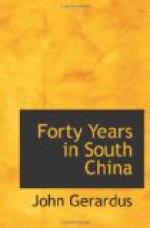“He worked unwearily from the sunrise of youth, to the sunset of old age, and then in the sweet nightfall of death, lighted by the starry promises, went home, taking his sheaves with him. Mounting from earthly to heavenly service, I doubt not there were a great multitude that thronged heaven’s gate to hail him into the skies,—those whose sorrows he had appeased, whose burdens he had lifted, whose guilty souls he had pointed to a pardoning God, whose dying moments he had cheered, whose ascending spirits he had helped up on the wings of sacred music. I should like to have heard that long, loud, triumphant shout of heaven’s welcome. I think that the harps throbbed with another thrill, and the hills quaked with a mightier hallelujah. Hail! ransomed soul! Thy race run,—thy toil ended! Hail to the coronation!”
At the death of David T. Talmage the Christian Intelligencer of October 25, 1865, contained the following contribution from the pen of Dr. T.W. Chambers, for many years pastor of the Second Reformed Church, Somerville, New Jersey, now one of the pastors of the Collegiate Church, New York:
“In the latter part of the last century, Thomas Talmage, Sr., a plain but intelligent farmer, moved into the neighborhood of Somerville, N.J., and settled upon a fertile tract of land, very favorably situated, and commanding a view of the country for miles around. Here he spent the remainder of a long, godly, and useful life, and reared a large family of children, twelve of whom were spared to reach adult years, and to make and adorn the same Christian profession of which their father was a shining light. Two of these became ministers of the Gospel, of whom one, Jehiel, fell asleep several years since, while the other, the distinguished Samuel K. Talmage, D.D., President of Oglethorpe University, Georgia, entered into his rest only a few weeks since. Another son, Thomas, was for an entire generation the strongest pillar in the Second Church of Somerville.
“One of the oldest of the twelve was the subject of this notice; a man whose educational advantages were limited to the local schools of the neighborhood, but whose excellent natural abilities, sharpened by contact with the world, gave him a weight in the community which richer and more cultivated men might have envied. In the prime of his years he was often called to serve his fellow citizens in civil trusts. He spent some years in the popular branch of the Legislature,




